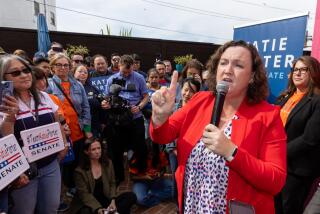Bank of America Angered Over Gray Davis’ TV Ad on Refunds
- Share via
SACRAMENTO — State Controller Gray Davis on Thursday launched a campaign to locate about 2 million depositors of the Bank of America who are owed $36 million in refunds.
However, the bank took issue with a centerpiece of the campaign--a Davis television commercial in which he accuses the financial institution of a customer “rip-off.”
The bank several weeks ago reached a final settlement with the state over how much money the bank owed customers whose long-dormant accounts had been wiped out or reduced by bank service charges.
“Our concern is the way the controller is portraying the bank in the ads,” bank spokesman Peter Magnani said. “We think it is unfair and untrue.”
‘Political Attack’ Alleged
He said the bank may run its own advertisements or seek a court order to block broadcast of the Davis commercials. One Davis assistant said the bank threatened to run “political attack” commercials against Davis, an allegation Magnani insisted he knew nothing of.
As part of a $1-million “public awareness” campaign to locate the depositors or their heirs and reunite them with their funds, Davis previewed a 30-second television commercial scheduled for broadcast in Southern California on Monday.
Political observers see the ad campaign as something of a publicity bonanza for Davis, who is considered a likely candidate for governor.
In the commercial, Davis repeats some of the heavy rhetoric used in the late 1970s by his predecessor, Controller Ken Cory, to assail the bank for its former practice of reducing or wiping out inactive accounts with service charges and for failing to pay interest on the funds.
Charge by Davis
“It’s an outrage,” Davis charges in the television spot. “A multibillion-dollar bank exploiting its own depositors.” An off-camera announcer calls it “the Bank of America rip-off.”
The “public awareness” program is part of a total $53-million settlement reached between the state and the bank. As part of the program, Davis has set up a toll-free telephone number--(800) 877-7777--for bank customers who believe that they may have a refund coming.
The original lawsuit was filed in 1975 by Cory and was settled in stages over the last three years. Cory had charged Bank of America and several other banks with illegally levying service charges on accounts that had been dormant for seven years and failing to credit interest to them. Any remaining balance was then sent to the controller as “unclaimed property.” In some cases, service charges eliminated the accounts, often those of schoolchildren.
In 1981, a Superior Court judge in Sacramento ruled that such practices were illegal and ordered efforts be made to find account holders, many of whose records had been destroyed by the bank, and to “reunify” them with their money.
Search Mandated
Under state law, the banks must make an effort to locate holders of dormant accounts or financial instruments such as cashier’s checks and money orders. If they cannot be found, the funds are sent to the state controller, who must make a similar search.
Of the $53-million settlement, almost $36 million was in cash. In lieu of cash, another $17.2 million worth of environmentally important real estate, including a redwood forest in Santa Cruz County, was deeded to the state by the bank and will be managed by the nonprofit Nature Conservancy.
Davis told reporters that the Bank of America was attempting to block his “public awareness” campaign, “silence me” by threatening to sue and to “mount its own advertising campaign against” him.
Davis asserted that the bank wants his ads “sugar-coated.”
Warned on Ad
Bank spokesman Magnani conceded that bank attorneys had warned that they might seek legal action and start their own advertising campaign to “acquaint the public with the fact that they might have a refund due to them through the controller.”
However, D. Robert Shuman, chief counsel to Davis, said the bank’s attorney, Winslow Christian, bluntly warned him that the bank ads would “be a political attack on Gray . . . and would give him a ‘bloody nose.’ ”
Magnani said when the bank became aware of the Davis ad it “made our objections known to (Davis) . . . I don’t know what Winslow said to Davis’ office or what Davis’ office said to him.”
More to Read
Get the L.A. Times Politics newsletter
Deeply reported insights into legislation, politics and policy from Sacramento, Washington and beyond. In your inbox twice per week.
You may occasionally receive promotional content from the Los Angeles Times.








